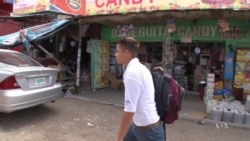President Obama and Central American leaders recently agreed to come up with a plan to address poverty and crime in the region that is fueling the surge of young migrants trying to illegally enter the United States. One such program in Honduras - funded in part by the United States - gives street kids not only food and safety but a chance for a better life without, crossing the border.
Carlos Lato walks the poor market district of Tegucigalpa, looking for children living on the street to make them an offer that seems too good to be true.
“We will give you food, transportation. We will give you an education and your family won't have to pay any money," he said.
Lato is a recruiter for Casa Alianza, a U.S.-based Catholic Church assistance organization. It provides young people an alternative to a life of poverty, drug abuse and gang violence. However, many of the children he encounters decline his offer. Some - like one 12-year-old boy who works some days hauling trash - must help support their families.
“It's that I cannot go because it's my mother's decision whether I go or not," he said.
But those who do join find shelter and education.
“They protect us. They help us with everything we need, school, everything that we need," said Jesenia Chevez, who has been with the program for four years. "They help us and it's a better opportunity here."
In addition to traditional academic subjects, training coordinator Nelly Garcia says these former street kids also learn how to trust each other.
“Work as a team, collaborate, participate and show respect, these are the kinds of training we give them," said Garcia.
And they provide vocational training. Nery Venagas was twice apprehended trying to cross into the U.S. before he came to Casa Alianza. Here he learned a trade - cutting hair - and says now his future is in Honduras.
“I realized that if God was going to bless me, he would do it here in my country,' he said. "I don't see traveling as something outside the law, but sometimes the experience is not the best."
Advocates for increased U.S. assistance to the region say the success of programs like the Casa Alianza helps demonstrate that the best way to end the surge of illegal immigrants to the U.S is to provide young people in Central America more opportunities for a better life at home.






